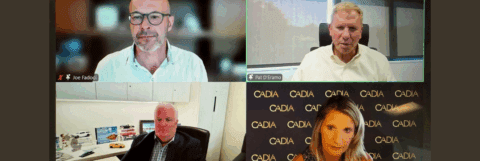MichAuto
Anjelica Miller
July 24, 2025
Many organizations are reevaluating their strategies with today’s pushback against DEI and increasing complexity around compliance. However, backing away from inclusion is not good leadership, as discussed on July 16 among members of the Center for Automotive Diversity, Inclusion, and Advancement (CADIA), a MichAuto investor. During this closed discussion moderated by CADIA’s Cheryl Thompson, MichAuto’s Glenn Stevens Jr., Martinrea’s Pat D’Eramo, and BorgWarner’s Joe Fadool explored what a more holistic, human-centered, and authentic approach to DEI looks like.
Create Opportunities and Showcase Them
Among the ideas on how to encourage and increase DEI, D’Eramo talked about Martinrea’s “Did DEI Die?” quarterly global newsletter, a response to political backlash over DEI that showcases how the company takes its core principle of inclusivity and constructs activities and business needs around that.
“[The DEI-related programs] are the most active and we took the time [with the newsletter] to re-explain what each of those are just to reintroduce it, even though it’s widespread throughout the company,” D’Eramo said. “We didn’t question people’s beliefs initially, so why would we change now? So, I think [the newsletter] will be very well accepted.”
D’Eramo also spoke about creating opportunities for existing employees if you are looking for a certain type of individual. For example, when Martinrea was looking for more diversity in its forklift staff, D’Eramo and other managers set up a time and designated spot and invited everyone who was curious about forklifts to check it out.
“Over this period of time, there was a lot of interest, and once they got up on the fork truck and realized, yeah, this isn’t so difficult,” D’Eramo said. “Fast forward two years, half of the plant or more now have women forklift drivers.”
These “semi skill” moments allow aspirational employees to try new duties and create a strong set of diverse employees over time.
“Go and See” People Where They Are At
Stevens spoke about how MichAuto investors feel regarding the DEI backlash, to which he has not seen anyone “foundationally or institutionally changed the way they’re doing business” because businesses have already committed to having the right, diverse, inclusive workforce. For those looking to increase their DEI efforts, Stevens suggested personally implementing “genchi genbutsu,” a Japanese phrase that means “go and see” and encourages people to meet others where they are at.
“You gotta get out of your desk, out of your office, out of your comfort zone, and go walk the floor,” Stevens said. “It’s about being open and curious and having that mindset, and it’s about practicing the lost art form of listening.”
Stevens also spoke about how defining equity is a very individual personal thing and can mean something different based on the individual.
“Equity, I think, is how we see and treat others,” he said. “Do we treat them with mutual respect? Do we understand or seek to understand their viewpoints, their upbringings, where they come from? And do we lead with empathy?”
The Best Teams Are the Most Diverse
Fadool dismissed the negative policies and opinions against DEI like the other panelists. As a Chief Executive Officer and a sports fan, he is often reminded that the best teams are diverse in talent, so “diverse experiences, backgrounds, genders, ethnic backgrounds matter” in business, and those teams “win at the end of the day.”
“Unlike politics, which is trying to tear down and create an incorrect narrative around DEI, we can’t just lead half of our people,” he said. “It’s up to us to meet people where they’re at, bring them along, manage the change, make sure they feel they can achieve their potential and have real purpose and what they’re doing.”
Fadool suggested that leaders should “pay attention” to the political environment but “don’t let it consume you.” Instead, they should take action by assessing and adjusting things that can be controlled within the company.
“There’s enough injustice in the world that we don’t control, but we need to control the spaces that we have influence over, things like pay and merits and even simple things like seating arrangements,” he said. “We’ve got to take over the [equity] narrative again, and we can do it by being more specific, more authentic, and not leaving it open to too much interpretation.”


